
Millennials have been called “lazy,” “entitled,” “selfish,” and “demanding,” but despite accusations that they’re ruining the modern workforce, more young people today are making sacrifices for their careers than they may get credit for.
In reality, when it comes to landing their dream jobs, millennials often have a strong desire to make a large impact. Even if their first or current gig isn’t where they hope to ultimately land, working hard to develop a foundation of knowledge and a growing network of professional contacts could be the boost they need to reach their goal in the future.
Since Nitro spends so much time advising millennials on their finances, we often end up speaking to them about their careers as well. To learn more, we surveyed 364 single employed millennials without children on what they would sacrifice for their career. Our study reveals how many young people would stay single to focus on work and how many would break up with a significant other if it meant getting a promotion or raise. Keep reading to learn more.
Long-Term Limits
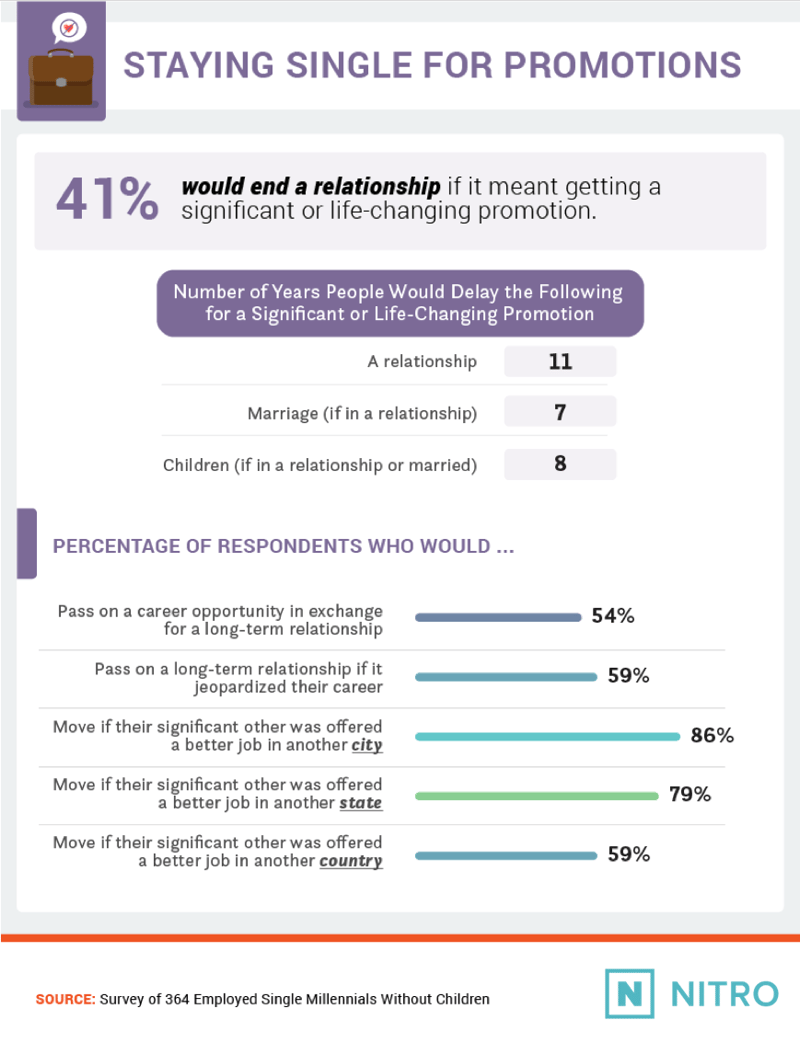
Between debt (including student loans) and available job prospects, some millennials are starting to worry about their financial futures. Young Americans have more student loan debt today than any generation previously, and more than 2 in 5 millennials were willing to end a relationship if it meant getting a significant or life-changing promotion at work.
These transformative jobs were so important to millennials that the average respondent admitted they were willing to stay single for 11 years, delay marriage for seven years, and wait to have children for eight years if it meant scoring the right opportunities.
Thankfully, long-term relationships may not be in equal peril. More than half of employed millennials would pass on a career opportunity that cost them an established partner, and 86% would move if their significant other were offered a better job in another city. When it came to making sacrifices for their career, most millennials would make major changes for their partner’s professional aspirations too. In fact, 59% would move to another country to accommodate their partner’s career.
Capital Concerns
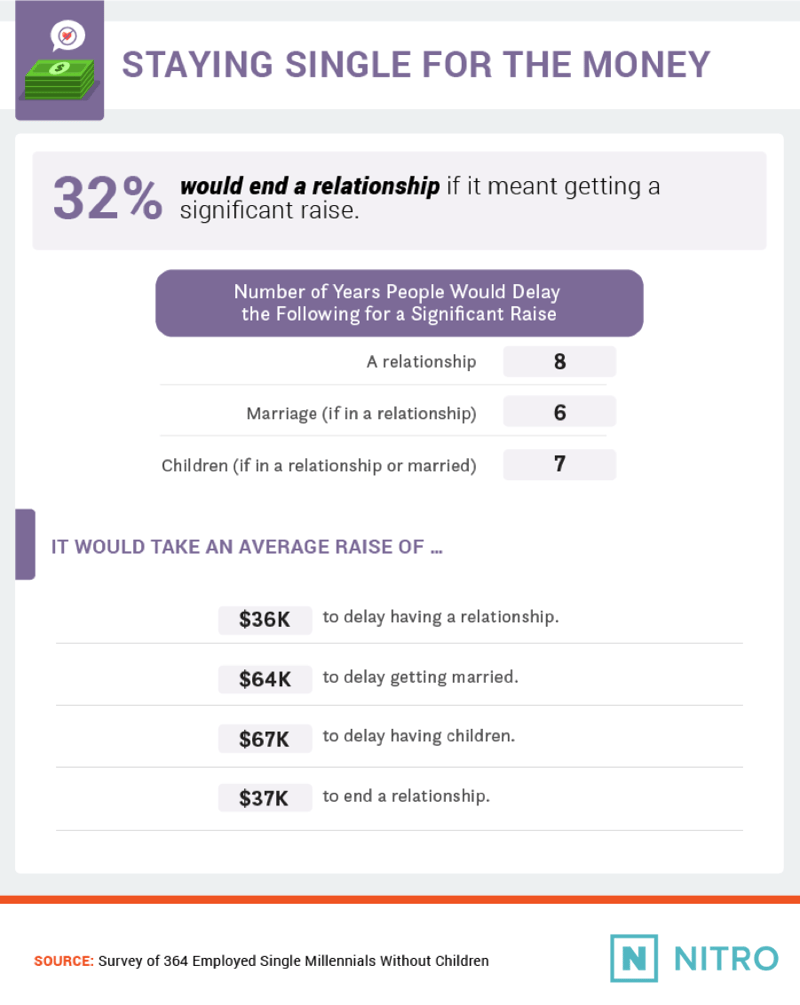
In every state except Washington, D.C., millennials earn a median annual income of less than $26,000 – or just $13 an hour. Considering the average household owes roughly $49,000 in student debt, averaging payments of more than $350 a month for graduates in their 20s, adding to their earnings could have a powerful impact on millennials’ ability to do things like travel or buy a first home.
A hunger for better-paying jobs could help explain why more young Americans today are single or unmarried. Nearly 1 in 3 millennials surveyed were willing to end a relationship if it meant getting a considerable raise at work and would stay solo for eight years, on average, to make significantly more money.
And how much money would it take to delay these major milestones? For $36,000 on average, more millennials would stay single longer, and for $37,000, they’d end a relationship completely. Delaying marriage or children was a more expensive consideration, although, for an average raise of $64,000, millennials would put a pause on matrimony, and for a raise or promotion of $67,000, they’d consider postponing having kids.
Single-Minded Stints
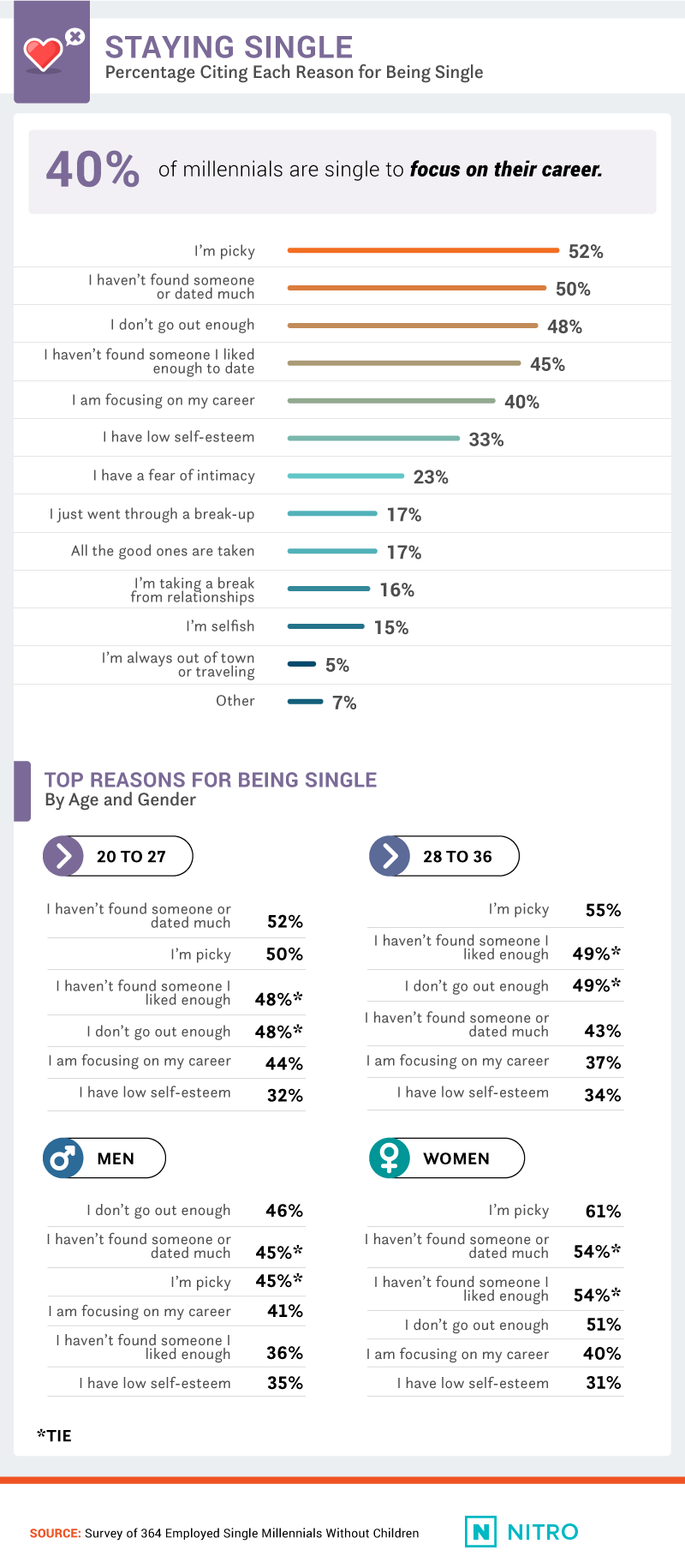
According to those surveyed, 40% of employed single millennials without children say one of the primary reasons they’ve stayed stag is to focus on their careers. Considering more than 1 in 3 working millennials are additionally clocking in at one or more side gigs, their long hours may not be good for fostering romantic relationships in the first place. Perhaps even more relevant to working millennials, experts suggest personal relationships can have a major impact on people’s professional life, and dating someone whose career goals don’t line up with your own could be a roadblock to success.
Younger millennials (those between 20 and 27 years old) were more inclined than older millennials (ages 28 to 36) to list focusing on their careers as a primary reason for being single, and more than half of Americans 27 and younger also admitted they hadn’t found the right person or dated much in the first place. In contrast, 55% of millennials between the ages of 28 and 36 said being picky was a primary reason for flying solo, followed by not finding someone they like enough and not going out enough (49% each).
Mind the Relationship Gap
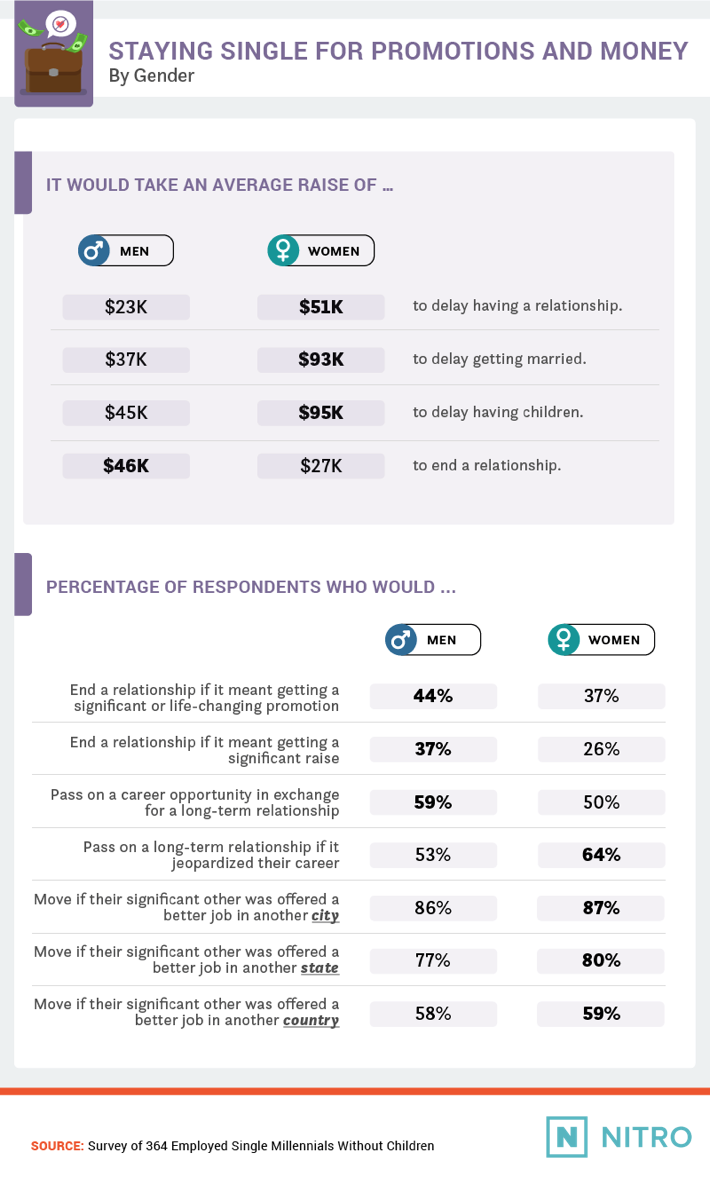
Of the 364 millennials surveyed, men were willing to make most love life sacrifices for roughly half the money women needed to make the same decisions. While men only needed an average raise of $23,000 to delay a relationship, women would only stay single if the raise was $51,000. Women also needed $56,000 more than men to stall marriage, and $50,000 more to delay having children.
Studies have shown women tend to see the path to success as being less straightforward than men and define their own sense of accomplishment differently by comparison. Instead of pursuing professional success for the sake of success, women find inspiration through different avenues beyond traditional career advancements or promotions.
Women surveyed were less likely to end a relationship for a life-changing promotion or significant raise, though men were more inclined to give up a significant career opportunity in exchange for a long-term relationship. Women were also slightly more willing than men to make sacrifices for their significant other’s career, including moving to another city, state, or country.
Waiting on Weddings
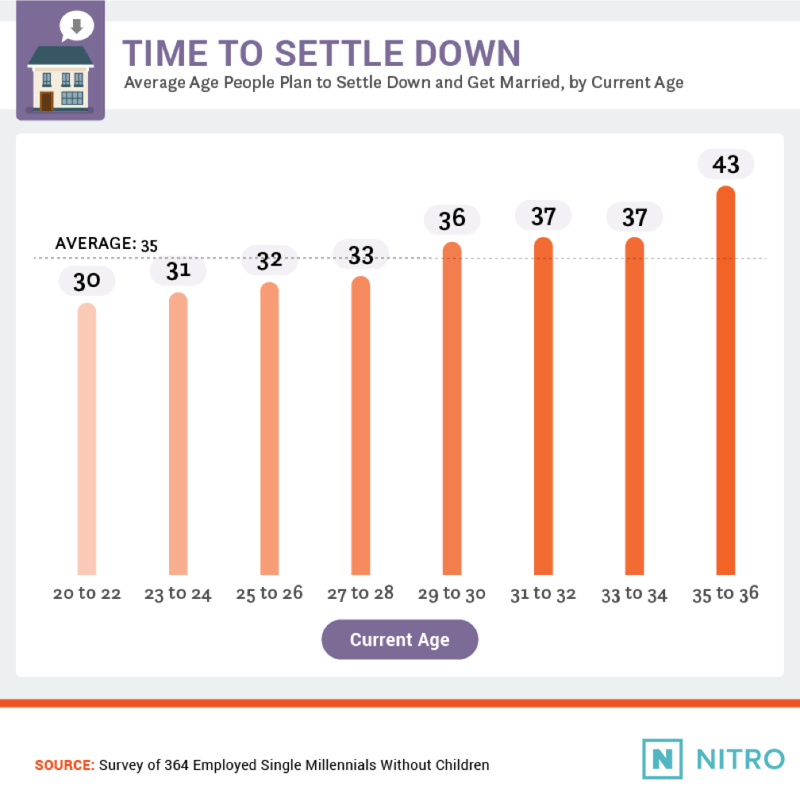
While some millennials may not be in a rush to get married or settle down, research indicates many still plan on getting hitched eventually. With the average wedding in 2016 costing over $35,000, not all millennials feel prepared to settle down with their current financial situation. But how long are they really planning on waiting before tying the knot? As it turns out, they may be putting off their “I do’s” even longer than originally anticipated.
Even the youngest millennials didn’t expect to get married until their 30s. People aged 20 to 22 expected to be married by 30, while those in their late 20s (between 27 and 28) were putting off settling down until 33. Millennials in their early 30s are putting off matrimony, too. People between 29 and 30 expected to be married by the time they were 36, while millennials between 35 and 36 planned to stave off marriage until they were 43.Shifting Relationship Priorities
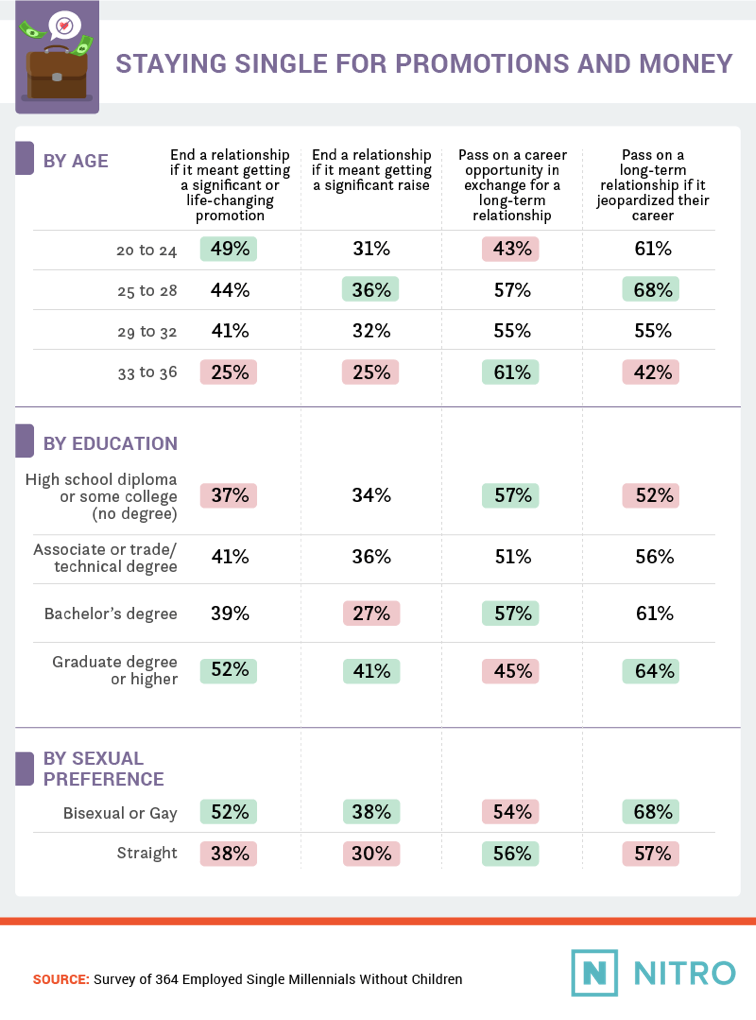
Even though young people were willing to stay stag for longer periods if it meant focusing on their career or accepting higher paying jobs, that sentiment may not last forever. Older millennials surveyed were less likely to give up a significant other for their job but were more likely to pass on career opportunities that might jeopardize a long-term relationship.
While staying focused and avoiding distractions may be good career advice for people of any age, a healthy relationship can have a positive impact on professional aspirations as well. Studies show a strong relationship can have a favorable effect on mental wellness, sleeping patterns, stress, and even physical health. Getting better sleep at night might not sound like it has a lot to do with workplace success, but research shows a healthy nighttime routine can make people feel more productive, focused, and creative during the day.
A Better Balance
While millennials struggle to find high-paying jobs, balance their financial obligations (including student debt), and continue to work more than one gig at a time, they were even more willing to sacrifice their relationships to enhance their career. While more popular among the youngest millennials, even people in their late 30s would still put off settling down and getting married for the sake of promotions and raises.
If financial obligations like student loans weigh you down, Nitro is here to help. At Nitro, we know monthly student loan payments can be a burden, and getting out from under student debt can feel impossible. If you’re looking to pay down your loans as quickly and easily as possible, refinancing could be the solution for you. By comparing rates with leading lenders across the country, Nitro will help you find the best refinancing options for your degree and loans. Imagining life without student loan payments doesn’t have to feel like fiction. Want to know how refinancing can change your life? Visit us at NitroCollege.com to learn more.
Methodology
We collected 364 responses from Amazon’s Mechanical Turk. 49% of participants were female, 50% were male, and 1% did not identify with either gender. Participants ranged in age from 20 to 36, with a mean of 28 and standard deviation of 4.02. Only employed single participants without children who lived in the U.S. qualified to take the survey and were included in the analysis.
Limitations
The sample size of single employed millennials without children was 364 people. It is possible that with more participants, we could have gained more insight into this population.
No statistical testing was performed, so the claims listed above are based on means alone. As such, this content is purely exploratory, and future research should approach this topic in a more rigorous way.
Sources
- http://www.dailymail.co.uk/news/article-4093670/Millennials-entitled-narcissistic-lazy-s-not-fault-Expert-claims-child-wins-prize-social-media-left-Gen-Y-unable-deal-real-world.html
- https://www.inc.com/ryan-jenkins/this-is-why-millennials-are-entitled.html
- http://www.phillymag.com/news/2016/01/08/boomers-millennials-workforce/
- https://www.forbes.com/sites/larryalton/2016/12/22/millennials-are-struggling-to-get-jobs-heres-why-and-what-to-do-about-it/#15bf9b0f4bb0
- https://www.thebalance.com/us-economic-outlook-3305669
- http://news.gallup.com/poll/191462/gallup-analysis-millennials-marriage-family.aspx
- https://www.forbes.com/sites/reneemorad/2016/09/29/survey-more-than-one-third-of-working-millennials-have-a-side-job/#70afc858132f
- http://www.lifehack.org/articles/work/how-your-relationship-influences-your-career.html
- https://www.marketwatch.com/story/millennials-say-anxiety-about-money-is-literally-making-them-sick-2017-09-01
- https://dc.curbed.com/2016/6/23/12013024/apartment-rent-washington-dc
- https://www.romper.com/p/how-much-does-the-average-millennial-make-the-number-is-surprisingly-low-51243
- https://www.forbes.com/sites/sarahlandrum/2017/10/20/the-impact-of-student-loan-debt-on-millennial-happiness/#2d600b357125
- https://www.cnbc.com/2017/10/03/zillow-the-top-2-reasons-more-millennials-cant-buy-homes.html
- https://qz.com/946816/millennials-are-more-likely-than-their-parents-to-think-womens-place-is-in-the-home/
- http://news.gallup.com/poll/191462/gallup-analysis-millennials-marriage-family.aspx
- https://www.washingtonpost.com/news/soloish/wp/2017/02/02/6-things-that-cost-as-much-as-the-average-u-s-wedding/?utm_term=.cc638c8f53e4
- http://www.thisisinsider.com/health-benefits-of-being-in-a-relationship-dating-someone-2017-10
- https://www.forbes.com/sites/brianrashid/2017/05/14/how-i-hacked-my-sleep-to-become-10x-more-productive/#38071942a7b4
Fair Use Statement
Want to share our story or graphics on millennials and their sacrifices for work? Feel free to repost our study for any noncommercial use; just make sure to link back to this page, so our contributors get credit for their work too.